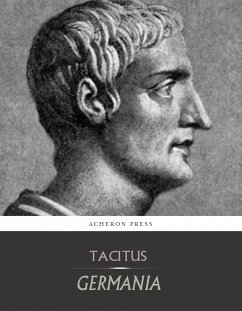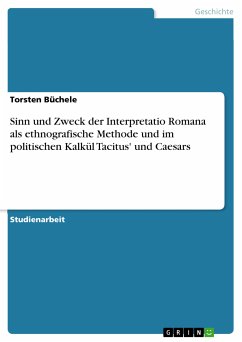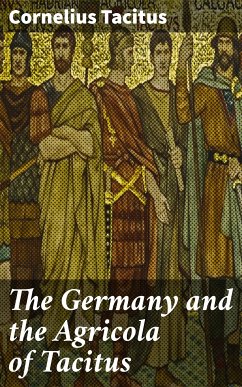
Germania (eBook, ePUB)
Enriched edition. Insights into the Germanic tribes beyond Roman borders
Kommentar: Montague, Wesley / Redaktion: Good Press

PAYBACK Punkte
0 °P sammeln!
In 'Germania', the Roman historian Tacitus presents a meticulous ethnographic study of the diverse tribes inhabiting the region that is now modern-day Germany. Written around AD 98, the text is characterized by its incisive prose and keen observations, blending historical narrative with ethnographic detail. Tacitus employs a comparative approach, juxtaposing the perceived virtues and vices of the Germanic tribes with those of Roman society, thereby reflecting on the broader themes of civilization, cultural integrity, and the moral decay of Rome itself. This work, steeped in the literary tradit...
In 'Germania', the Roman historian Tacitus presents a meticulous ethnographic study of the diverse tribes inhabiting the region that is now modern-day Germany. Written around AD 98, the text is characterized by its incisive prose and keen observations, blending historical narrative with ethnographic detail. Tacitus employs a comparative approach, juxtaposing the perceived virtues and vices of the Germanic tribes with those of Roman society, thereby reflecting on the broader themes of civilization, cultural integrity, and the moral decay of Rome itself. This work, steeped in the literary traditions of classical antiquity, serves as both a social commentary and a cautionary tale about the fate of societies ensnared by excess and corruption. Tacitus, a senator and a provincial governor, was deeply embedded in the political and cultural dynamics of the Roman Empire. His experiences as a public servant and his ties to the tumultuous events of his time informed his depictions of both Roman and barbaric societies. Tacitus's rigorous skepticism and pursuit of truth resonate throughout 'Germania', revealing the author's complex understanding of identity, culture, and imperialism, as he critiques Rome's waning influence by highlighting the strength and simplicity of the tribes beyond its borders. 'Germania' is an essential read for anyone interested in ancient history, anthropology, and the formation of cultural identity. Tacitus's unparalleled insight into the Germanic peoples not only enriches our understanding of the past but also prompts critical reflections on modern societal values and the perennial questions of cultural authenticity. This book is a profound exploration of the intersection between civilization and barbarism that remains relevant for contemporary readers. In this enriched edition, we have carefully created added value for your reading experience: - A succinct Introduction situates the work's timeless appeal and themes. - The Synopsis outlines the central plot, highlighting key developments without spoiling critical twists. - A detailed Historical Context immerses you in the era's events and influences that shaped the writing. - An Author Biography reveals milestones in the author's life, illuminating the personal insights behind the text. - A thorough Analysis dissects symbols, motifs, and character arcs to unearth underlying meanings. - Reflection questions prompt you to engage personally with the work's messages, connecting them to modern life. - Hand-picked Memorable Quotes shine a spotlight on moments of literary brilliance. - Interactive footnotes clarify unusual references, historical allusions, and archaic phrases for an effortless, more informed read.
Dieser Download kann aus rechtlichen Gründen nur mit Rechnungsadresse in A, B, BG, CY, CZ, D, DK, EW, E, FIN, F, GR, H, IRL, I, LT, L, LR, M, NL, PL, P, R, S, SLO, SK ausgeliefert werden.













